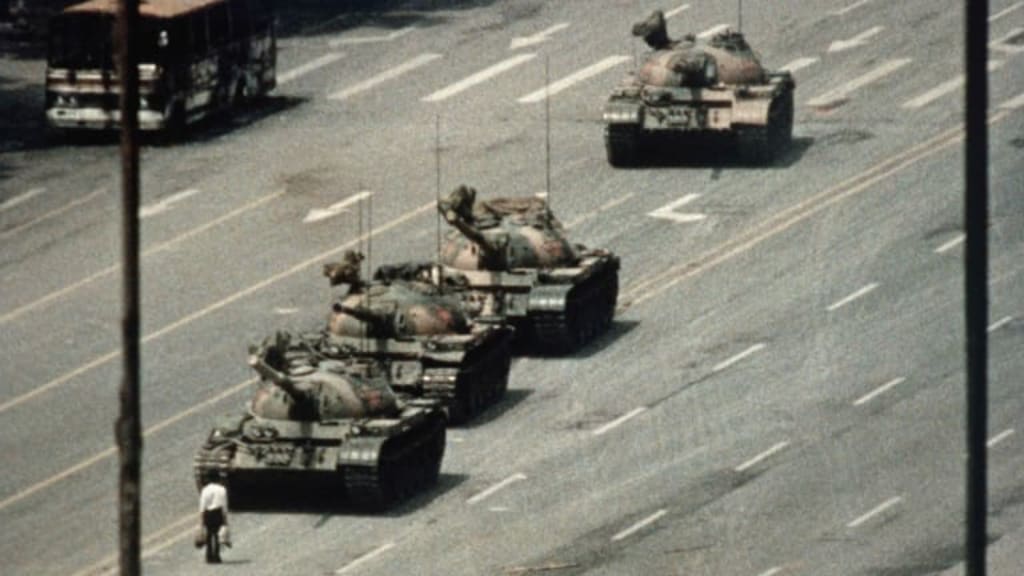Tiananmen Square Massacre
The Story Behind One of the Most Barbaric Acts Committed by a Government

Before we enter the nitty gritty aspects of what occurred on the fourth of June, there is some important background. Following the death of Mao Zedong in 1976, the Cultural Revolution also came to an end. It was a socio-political movement led by Zedong between 1966 and 1976 and its stated goal was to preserve "true" Communist ideology in the country by purging remnants of capitalist and traditional elements from Chinese society. This movement led to severe damage to China’s economy and the country was mired in poverty as economic production slowed down to such an extent it effectively was at a halt. At a Communist election meeting, Deng Xiaoping emerged as China’s de facto leader. To repair China’s broken economy, Deng implemented a comprehensive program, which refers to the reforms termed "Socialism with Chinese characteristics."
These reforms were carried out in two stages. The first occurred between 1976 and the early 1980s involved the de-collectivization of agriculture, the opening up of the country to foreign investment and permission for entrepreneurs to start businesses. The second stage involved the privatisation of some state-owned industries, as well as the removal of several protectionist policies, however as seen in recent news China has taken a trip down memory lane with Donald Trump. This reform led to unprecedented growth in China’s economy, in quantitative terms, around 9.5% a year between 1978-2013.
Whilst the reforms were generally well received by the public, there were growing concerns regarding social changes that were brought about, including corruption and nepotism by elite party bureaucrats. The state-mandated pricing system, in place since the 1950s, had been keeping prices at a sustainable level, allowing the economy to grow at a steady rate. The initial reform shifted the balance as some prices were fixed while others were allowed to fluctuate. This led to the expansion of the money supply in the economy as it allowed people with powerful connections to buy goods at low prices and then sell it at market price. This led to at least a third of factories becoming unprofitable. To correct this, the government tightened the money supply in 1988, leaving a lot of the economy without loans.
Following another meeting, Deng agreed to a transition to a market-based pricing system, and this relaxation of price controls triggered waves of cash withdrawals. This led to buying and hoarding all over China, which threw the Chinese government into a panic, and they rescinded the reforms within two weeks. This led to existential levels of inflation, and reports show that the CPI increased by 30% in Beijing between 1987 and 1988. This led to a panic amongst salaried workers that they could no longer afford staple goods. Moreover, in the new market economy, unprofitable state-owned enterprises were pressured to cut costs, in other words to fire workers, leading to an increase in unemployment.
In late 1986, astrophysics professor Fang Lizhi believed that China’s economic situation was a cause of the rigid command economy. Deng tried to squash Fang’s voice by saying he was blindly following the West and their capitalist ways, but this had the adverse effect. It inspired students in Fang’s hometown of Hefei to start protesting against the slow pace of reform. These protests quickly started to spread to other major cities such as Beijing and Shanghai. General secretary Hu Yaobang was blamed for taking a soft attitude and mishandling the protests, which showed a leniency, and was promptly forced to resign. Two years later, April 1989, Yaobang suddenly died due to a heart attack, and many students who believed in his ideologies believed his resignation was the death of him.
From this point onward, student protests continued to increase. By June 1989, there were approximately 80,000 people on Tiananmen Square all protesting the way in which the government was running the country. Due to the fact that martial law had been passed a couple months earlier, during the intermediate stages of the protest, the army was given permission to clear the square by all means necessary. And so, in the early hours of the fourth of June, several army platoons unleashed bullets into the defenceless crowd. According to the then British ambassador, the civilian death toll was around 10,000 civilians, whereas less than 50 soldiers lost their lives.
The massacre at Tiananmen Square is arguably one of the most inhuman acts ever carried out by a government. In its wake, China now forbids any discussion of what occurred on the fourth of June as well as the censorship of any written piece referring to the massacre, showing how horrendous the actions of the Chinese government were.
About the Creator
Rushat Chandra
19 year old Londoner that likes to write especially about economics related topics





Comments
There are no comments for this story
Be the first to respond and start the conversation.